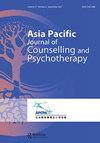Editorial: inspiration from psychotherapeutic practice and supervision in Asian cultures
IF 0.5
4区 心理学
Q4 PSYCHOLOGY, CLINICAL
Asia Pacific Journal of Counselling and Psychotherapy
Pub Date : 2021-07-03
DOI:10.1080/21507686.2021.1966889
引用次数: 0
Abstract
Greetings! Welcome to the second issue of the Asia Pacific Journal of Counselling and Psychotherapy in 2021! This is a collection of counselling and psychotherapy-related studies specific to Asian cultures, including Hong Kong, Sri Lanka, China, Taiwan, and Singapore. In this issue, we bring a series of impressive articles that cover topics including therapeutic alliance, assessment approaches, strength-centred therapy and supervisory identity development. A good collaborative relationship between client and therapist, i.e., therapeutic alliance, plays a crucial role in therapeutic outcomes. Lek Hon Edmond Pong, Raysen Cheung and Calvin Kai-Ching Yu examine the predictive powers of clients’ personality traits, affective attributes, relationship security, and expectations on therapeutic working alliance in the Hong Kong Chinese context. They propose a model which comprises three factors including relationship insecurity, caring, and client involvement. Hopefully, counsellors and psychotherapists can attain insights on building up a good therapeutic alliance with clients in Chinese context. In building up a therapeutic relationship, a deep understanding of clients is crucially important. There are many effective ways to acquire such understanding. Many psychological professionals use psychological tests or psychometric scales to explore clients’ personalities, emotional functioning, and thinking patterns. The Rorschach Inkblot Test is a projective psychological test, which can be used for this purpose. James Yu and Queenie Lee argue that a lifeworld assessment approach allows collaboration between client and therapist to explore life themes and personal meanings of the assessment data. They innovatively integrate this approach with the use of the Rorschach Inkblot Test for the purpose of initial therapeutic exploration. The key assessment process is illustrated with a child case in Hong Kong. Authenticity can be used as one of the indicators of a person’s psychological wellbeing. Piyanjali de Zoysa, Shamala Kumar, Santushi D Amarasuriya, and Navneth S R Mendis discuss their application of the Sinhala version of the Authenticity Scale to undergraduate students in Sri Lanka. Their results elucidate how the construct of authenticity can be appropriately and effectively operationalized and assessed; and how authenticity may vary as a function of gender and faculty of study. They discuss the potential use of the Sinhala version of the scale. The authors observe higher authenticity in females than in males. This reminds therapists to consider gender-related factors in counselling sessions. Jonah Li and Joel Wong propose that strength-centred therapy can be a positive and culturally flexible therapeutic approach for Chinese clients. They explore the compatibility of strength-centred therapy with Chinese virtues and Chinese indigenous ASIA PACIFIC JOURNAL OF COUNSELLING AND PSYCHOTHERAPY 2021, VOL. 12, NO. 2, 109–110 https://doi.org/10.1080/21507686.2021.1966889社论:来自亚洲文化中心理治疗实践和监督的启示
问候!欢迎收看《亚太咨询与心理治疗杂志》2021年第二期!这是一组针对亚洲文化的咨询和心理治疗相关研究,包括香港、斯里兰卡、中国、台湾和新加坡。在本期中,我们将带来一系列令人印象深刻的文章,涵盖治疗联盟、评估方法、以力量为中心的治疗和监督身份发展等主题。客户和治疗师之间良好的合作关系,即治疗联盟,对治疗结果起着至关重要的作用。Lek Hon Edmond Pong、Raysen Cheung和Calvin Kai-Ching Yu研究了香港中国背景下客户的个性特征、情感特征、关系安全和对治疗工作联盟的期望的预测能力。他们提出了一个包括三个因素的模型,包括关系不安全、关心和客户参与。希望咨询师和心理治疗师能够在中国背景下与客户建立良好的治疗联盟。在建立治疗关系时,深入了解客户至关重要。有许多有效的方法可以获得这种理解。许多心理专业人士使用心理测试或心理测量量表来探究客户的性格、情绪功能和思维模式。罗夏墨迹测验是一种投射性心理测验,可用于此目的。James Yu和Queenie Lee认为,生活世界评估方法允许客户和治疗师合作,探索评估数据的生活主题和个人意义。他们创新性地将这种方法与罗夏墨迹测试的使用相结合,以进行初步的治疗探索。香港的一个儿童案例说明了关键评估过程。真实性可以作为一个人心理健康的指标之一。Piyanjali de Zoysa、Shamala Kumar、Santushi D Amarasuriya和Navneth S R Mendis讨论了他们将僧伽罗语版本的真实性量表应用于斯里兰卡本科生。他们的研究结果阐明了如何适当有效地操作和评估真实性的结构;以及真实性如何随着性别和学习能力的变化而变化。他们讨论了僧伽罗语版本量表的潜在用途。作者观察到女性的真实性高于男性。这提醒治疗师在咨询过程中要考虑与性别相关的因素。李(Jonah Li)和黄(Joel Wong)提出,以力量为中心的治疗方法对中国客户来说是一种积极且文化上灵活的治疗方法。他们探讨了以力量为中心的治疗与中华美德的兼容性,以及《中国土著亚太地区咨询与心理治疗杂志》2021,第12卷,第2期,109-110https://doi.org/10.1080/21507686.2021.1966889
本文章由计算机程序翻译,如有差异,请以英文原文为准。
求助全文
约1分钟内获得全文
求助全文

 求助内容:
求助内容: 应助结果提醒方式:
应助结果提醒方式:


